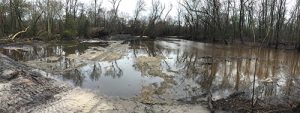
BERLIN – Last year’s agreement between the Town of Berlin and The Nature Conservancy has resulted in the restoration of 182 acres of wetlands along the Pocomoke River.
Mike Dryden, project manager and outreach coordinator for The Nature Conservancy, told the Berlin Town Council Monday that wetlands restoration work at the town’s spray irrigation facility was complete.
“So far everything looks really good,” Dryden said.
It was in February of 2016 that the council approved a 10-year wetlands restoration agreement with The Nature Conservancy. The agreement is part of the organization’s overall plan to use 4,000 acres along the Pocomoke River to recreate wetlands and reconnect flood plains. Restoring the wetlands is expected to reduce flooding, filter water and create habitat.
Dryden said the work, which involved constructing breaches, started just after Christmas and was completed three weeks ago.
“We were clearing out the spoil levee that was there and bringing the elevation to flood plain elevation,” Dryden said. “It was quite an operation out there.”
He said one of the most difficult parts of the project was simply clearing the area.
“I think it took us a week just to get to the river,” he said.
In addition to the breaches completed on the town’s property, The Nature Conservancy worked with two neighboring landowners to restore other wetlands in the area. In all he said 352 acres had been restored.
“That’s 528 million gallons of stormwater that will be stored in those reconnected flood plains during storm events,” he said.
During last week’s rain, the restored areas were put to the test. Dryden said that just as they were intended to, the restored areas stored overflow water from the river.
“It’s doing what it’s supposed to do,” he said.
Mayor Gee Williams said town officials had visited the area prior to the restoration.
“It’s not highly visible but it’s very important,” he said. “It’s hard to appreciate all the work that goes into this unless you’re there.”
Moving forward, Dryden said his organization will monitor the areas and make adjustments as necessary. He credited the cooperation of The Nature Conservancy, U.S. Fish and Wildlife, Natural Resource Conservation Services and the Department of Natural Resources with making the project possible.

